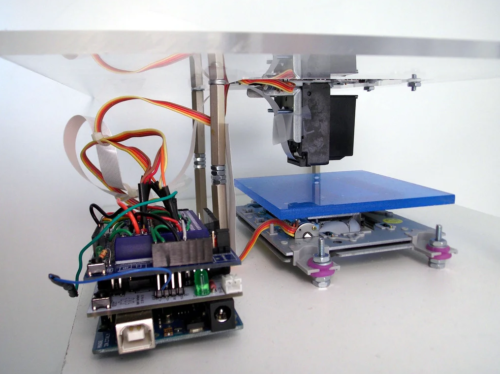You’re a doer. Nothing can stop you. Not even a lack of access to the specialized, low-cost tools needed to fully engage in citizen science. Below, we present ways you can build the tools and kits to help scientists answer pressing questions.
So roll up those sleeves to take on these DIY challenges at home — everything from inkjet printers MacGyvered into bio-printers, to bowls of flour and water transformed into yummy loaves of sourdough bread to help study microbes.
Take Part: Get Involved in Citizen Science Projects at SciStarter.org.


(Credit: CC BY-SA BioCurious)
BioPrinting is like 3-D printing, but with squishier ingredients! Our friends at BioCurious will show you how to build your own bioprinter with parts from old inkjet printers and CD players and get you started with some simple projects and experiments. Get started BioPrinting with BioCurious.


CanAirIO is a low-cost air pollution monitor designed to empower citizen scientists to track air quality in their community. (Credit: CanAirIO)
CanAirIO provides a step-by-step guide to build your own inexpensive air quality monitor.
Learn more, watch the tutorial (in English and Spanish!), and then access materials using SciStarter’s new tools database. Get started with CanAirIO.
(Credit: Ivan Marjanovic/Shutterstock)
As if bees don’t already have enough to worry about, parasitic fly infections are turning them into nocturnal, light-seeking “zombees.” Help scientists study this problem by building and deploying your own ZomBee Watch Kit. Get started with ZomBee Watch.
(Credit: mycteria/Shutterstock)
The Mosquito Habitat Mapper app, supported by NASA, features a DIY mosquito eradication kit. Follow in-app instructions and use household materials to remove small pockets of standing water where invasive, Zika-carrying mosquitoes breed. Get started with Mosquito Habitat Mapper.
Volunteers from the Green Vigil Foundation performing water quality testing. (Credit: Courtesy, EarthEcho International)
Join the international EarthEcho Water Challenge to monitor and help protect our valuable water resources. An inexpensive kit provides everything you need to get started. Get started with the EarthEcho Water Challenge.
Some citizen science projects require specialized tools to make an observation, record data, and more. The SciStarter Tools database will help you discover and access low cost tools, providing information about how you can build, borrow, or buy them. Makers and manufacturers can add tools, too. Get started with the SciStarter Tools database.
(Credit: SciStarter)
Still looking for more opportunities to exercise your creative impulses? Participating libraries have the science project kits you need! Check ’em out!
And if your local library doesn’t have kits yet, ask the librarian to contact us at info@SciStarter.org so we can help bring citizen science to them.
Knee injuries are common across all age groups, whether caused by athletic activity, accidents, or…
Crawl spaces are frequently disregarded when it comes to keeping a safe, smart, and healthy…
Westlake Village has a charming community atmosphere, beautiful scenery, and an upscale vibe. It's also…
Get festival-ready with this style guide. Discover what to wear for comfort and fun at…
Using solar-powered energy can help you save money and reduce reliance on the grid. But…
The summer heat can spell disaster for asphalt if you’re not careful. Protect your parking…